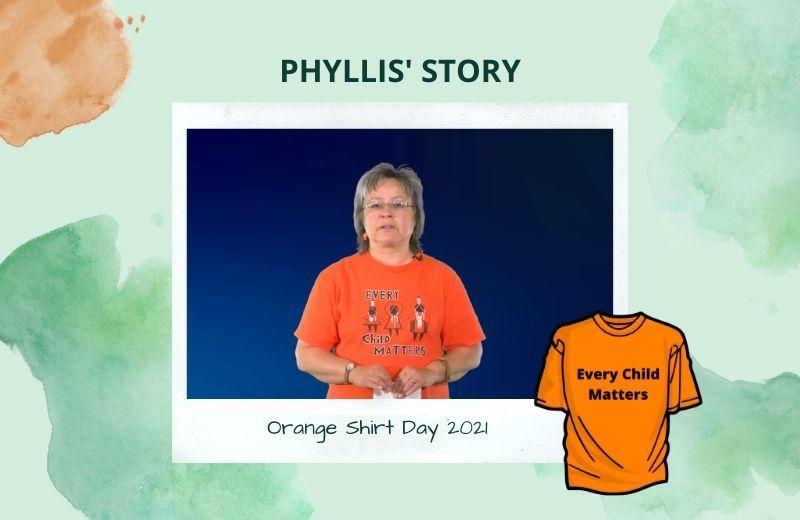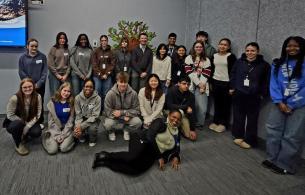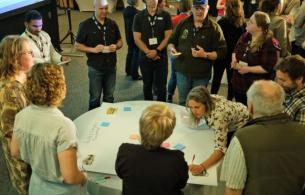Orange Shirt Day is a time of collective remembrance during which we honour those who attended Residential Schools as well as their families and communities. It is also a time to demonstrate personal and organizational commitments to reconciliation. This year Thursday, September 30 is Orange Shirt Day across Canada.
To support Northern Health’s awareness and understanding of the significance of Orange Shirt Day, the Indigenous Health team has been sharing information and resources each week throughout September.
This week, we are discussing Phyllis (Jack) Webstad’s experience as a young First Nations girl and the origins of Orange Shirt Day.
What is Orange Shirt Day?
Orange Shirt Day was created out of Phyllis’ story. In 1973, when Phyllis (Jack) Webstad was six years old, she was sent to the Mission School near Williams Lake, BC. Her first memory of her first day at the Mission School was that of having her own clothes taken away – including a brand new orange shirt given to her by her grandmother.
In 2013, Phyllis attended the St. Joseph Mission (SJM) Residential School (1891-1981) Commemoration Project and Reunion events that took place in Williams Lake. At this event, Phyllis shared her story with those in attendance – and Orange Shirt Day was born. The September 30th date was chosen because it was the time of year in which children were taken from their homes and families to residential schools, and the date now provides an opportunity to set the stage for anti-racism and anti-bullying policies for the current school year.
Phyllis’ story reminds us everyday of the children that were taken from their families and sent to residential schools. Residential schools represent a dark chapter in Canadian history and learning about these institutions can be difficult for many people. As hard as it may be for some people to learn about residential schools and our shared colonial history, it’s critical to acknowledge and recognize these topics in a spirit of ongoing learning and reconciliation. In British Columbia, there were 18 residential schools across the province with five of these institutions located in Northern BC1:
- Lejac Indian Residential School – Dates of operation: 1910-1976
- Lower Post Indian Residential School – Dates of operation: 1940-1975
- Elizabeth Long Memorial Home – Dates of operation: 1883-unknown
- Crosby Girls’ and Boys’ Homes – Dates of operation: 1879-1950
- Metlakatla Indian Residential School – Dates of operation: 1891-1962
This year, Orange Shirt Day is especially significant. In May 2021, we learned of the tragic discovery of the remains of 215 children buried at the former Kamloops Indian Residential School which was built on the traditional territory of the Tk’emlúps te Secwépemc First Nation. Following this discovery, similar findings emerged from other former residential school sites across Canada including Marieval Indian Residential School in Saskatchewan, where 751 unmarked graves were discovered. The Truth and Reconciliation Commission (TRC) wrote in its Final Report an estimated 4,100 unmarked graves are located at more than 130 former schools across the country2.
National Day for Truth and Reconciliation
September 30th is also the National Day for Truth and Reconciliation. This new statutory holiday was created in response to Call 80 within the TRC’s 94 Calls to Action which recommended the federal government establish a statutory holiday to commemorate a National Day for Truth and Reconciliation to honour survivors, their families, and communities3.
Establishing a National Day for Truth and Reconciliation is an important step toward reconciliation. Reconciliation is defined by the TRC as: “…establishing and maintaining a mutually respectful relationship between Aboriginal and non-Aboriginal peoples in [Canada]. In order for this to happen, there has to be awareness of the past, and acknowledgement of the harm that has been inflicted, atonement for the causes, and action to change behaviour4.” September 30th provides an opportunity for us all to recognize our shared colonial history, to commemorate the children who were lost and survivors, and to reflect on the ongoing legacy of residential schools.
Additional resources
- Canadian residential school history – a video produced by the Orange Shirt Day Society
- Phyllis Webstad’s story – a video produced by the Orange Shirt Day Society
- Honourable Murray Sinclair: Impacts of residential schools – a video produced by the Orange Shirt Day Society
- Truth and Reconciliation Commission of Canada – Calls to Action
- Honouring the Truth, Reconciling for the Future Summary of the Final Report of the Truth and Reconciliation Commission of Canada
Support available
Support is available for anyone affected by the residential school experience.
- A national Indian Residential School Crisis Line has been set up to provide support for former students and those affected. People can access emotional and crisis referral services by calling the 24-hour national crisis line: 1-866-925-4419.
- The KUU-US Crisis Line Society provides a First Nations and Indigenous specific crisis line available 24 hours a day, seven days a week, toll-free from anywhere in British Columbia. The KUU-US Crisis Line can be reached toll-free at 1-800-588-8717 or online.
- The Northern BC Crisis Line offers 24/7 support across the NH region, and can be reached at 1-888-562-1214.
[1] de Leeuw, S. (2007). Artful places: Creativity and colonialism in British Columbia’s Indian Residential Schools [Unpublished doctoral dissertation]. Queen’s University.
[2] Truth and Reconciliation Commission of Canada. (2015). Honouring the Truth, Reconciling for the Future Summary of the Final Report of the Truth and Reconciliation Commission of Canada.
[3] Truth and Reconciliation Commission of Canada. (2015). Calls to Action.
[4] Truth and Reconciliation Commission of Canada. (2015). Honouring the Truth, Reconciling for the Future Summary of the Final Report of the Truth and Reconciliation Commission of Canada.














Comments